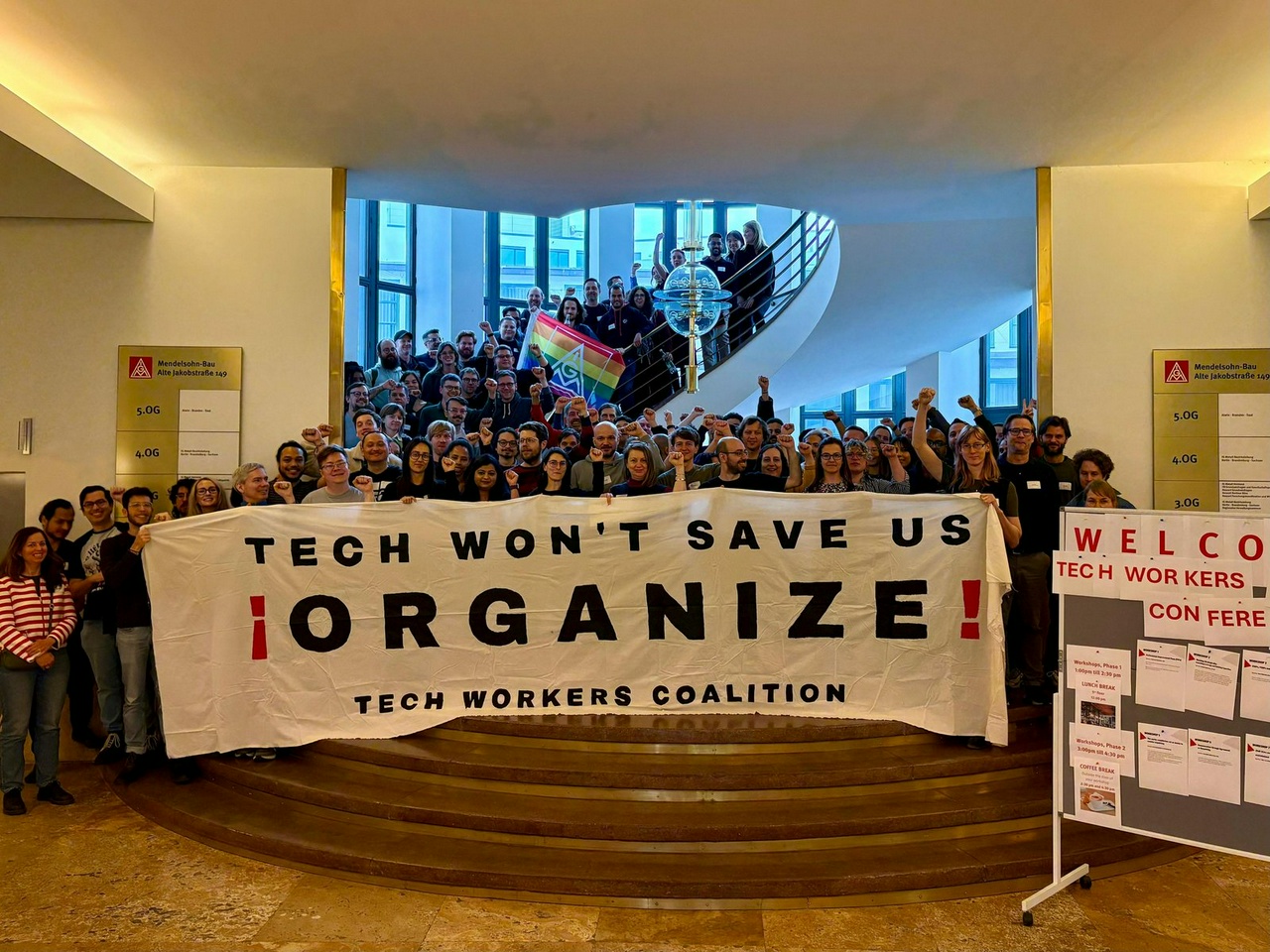- 209 Posts
- 72 Comments

 1·25 days ago
1·25 days agoI’m part of TWC and the organization of this call and I’m Italian. There are different timezones but it’s obviously hard to include all of them. Including UTC wouldn’t help most people.
The very fact that there are two events for two distinct timezones doesn’t suggest there’s an attempt to reach out to a bigger crowd?

 21·25 days ago
21·25 days agoBecause self-hosting adds complexity and friction, something that impact-oriented organizations might not be able to afford. TWC uses self hosting on more sensitive data anyway, just not on these tools.

 3·25 days ago
3·25 days agoThe Global chapter of Tech Workers Coalition

 2·25 days ago
2·25 days agoThe Session A time zone is good for Europeans too. Session B I guess could work for East Asia.
Why do you see this as USA-only?

 93·1 month ago
93·1 month agoFreedom of information is freedom for the most powerful to use that information for their profit. The more powerful you are, the more tools you have to harness common goods for profit.

 2713·1 month ago
2713·1 month agoGod forbid a technical person becomes an adult and starts understanding power, money, and politics. Engineers should be babies playing with their toys and being idealistic and irresponsible about their impact on the world.

 2·2 months ago
2·2 months agoIf you want a sandwich, you have to make it.
They don’t, but they are uninteresting for now

 5·4 months ago
5·4 months agoBecause the infrastructure group is concerned with more critical work around self-hosting than video calls. If you want to sponsor a jitsi server and do the plumbing work of replacing all our technical and organizational dependencies on zoom with Jit.si, feel free to join and expand our self-hosted infrastructure.
DMT and the Church are both technologies to access the experience of God, with very different costs. I agree on the worshipping part, in fact I’m talking about experiencing God, not worshipping. Worshipping is a way to eventually experience God, it’s not a consequence, at least within Christianity. Faith means trusting that through worshipping you will eventually have the experience of God, in a way or another.
Then if you prefer not to call it a God, that’s fine, but you miss out on the fact that countless people in the past millennia were talking about the same thing you saw on DMT. The God of Spinoza, Mulla Sadra or Plato is not necessarily a God to worship.
you’re defined by your environment, either by aligning to it or by rejecting it. You’re never free from it. What I’m saying is that that’s your understanding of spirituality and religion, even if you reject it, because most people around you employ that worldview. And it has very little to do with your rational side or critical thinking.
I’m not Christian. I was raised culturally Catholic but never practiced or believed in the Christian God. I’ve been excomunicated for a few years too. I have no connection to the Catholic in any form (except maybe some of their money funding some political stuff I do).
The Catholic Church, understood as the community of believers, is an organization going on for thousands of years, in every corner of the world, involving a few billions of humans. Every organization of that size will have stains in its history, especially if you judge them from the perspective of late-stage modernity morals, which the Church deliberately doesn’t participate in. They have their own system, and it clashes with the rationalist mindset because both systems have a claim to universalism, with the Christian universalism creating the modern colonial-scientific universalism. They are two sides of the same coin. I make little distinction between the two, because both eventually lead to oppression. That said, nowadays the Catholic Church is positioning itself as the main leader of the anti-fascist front in the Global North.
Also little historical note: quantitatively, the vast majority of witch burnings were done by protestants, not by catholics
I assume you’ve never experienced the existence of God, which is a pity. Great experience. 10/10, would recommend.
I guess you’ve never experienced the existence of aliens, which makes the two experiences equivalent in their absurdity to you, but you should consider that the vast majority of people out there did experience God in a way or another.
Sounds like normal person logic to me.
Are most of the people around you raised in a protestant culture? Because that would explain a lot.
The big selling point of Christianity was to move God and faith within the subject, moving away from external and ritualistic practices. Also, objectivity is a modernist perspective and it’s not an intrinsic valuable thing. Outside of rationalist bubbles in the global north, objectivity is pretty uninteresting trait to evaluate knowledge, because the knower and the known are never objective.
Some people tried to prove God through language and logic, but it’s beyond the point. The existence of God is much more easily experienced than proven.
The Bible was born as a support to create the community around which the experience of God was possible. A scenario in which a person is reading the Bible alone, thinking really hard about it, and comes out convinced of God’s existence is not what the Bible was written for or how it’s used in most forms of Christianity.
Yes people absolutely did write and read it as an historical account. You need to distinguish between multiple authors who did not sit in a writing room together and editors who collected the works. The reason why multiple reports were collected was to get at the truth. Long lists of names and events were included to establish historical credibility.
Were you raised in a protestant country? Because this is a very protestant logic.

 16·4 months ago
16·4 months agoIf you build the infrastructure for a certain thing to happen, you’re responsible for the thing. For the same reason we hold facebook accountable for the rise of the far-right, we should hold WikiPedia accountable for this stuff. Infrastructure is never neutral.

 8·5 months ago
8·5 months agoyeah, it’s quite big, because in a way it’s the biggest win so far for the BDS in American tech.








People don’t use forums anymore. Union organizing requires big numbers and being comfortable with being visible.
The URL shortener for sure could be addressed and I invite you to join and contribute to improve that part of the stack. Nonetheless, TWC is not a hacker space or a space for tech experts. You need to use the tools people already use and meet them where they are at. Using niche tools people are not familiar with introduces friction and barriers, that filter out people without tech skills, or without the attention and time to learn a new tool and incorporate it in their routines. Most tech workers are not programmers, remember that. Also people who are too privacy-focused and tech-focused tend to be bad organizers: union organizing implies risks and exposure, and you have to be comfortable with that, while privacy-focused people want to minimize individual risk by staying hidden. For sure privacy of your communication from the employer or the government plays an important role, because it might give sensitive information to your enemy, but if retaining privacy prevents you from having impact, it’s pointless to even start.